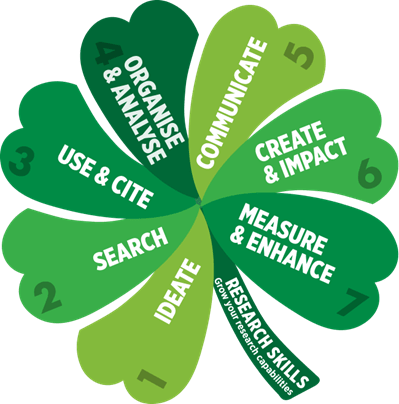By NUS Libraries STEM Research Librarians
In recent years, we adopt a scaffolded approach in teaching STEM (Science, Technology, Engineering and Medicine) information literacy to students. This involves giving bite-size, just-in-time and just-right content to support students’ learning journey. Teaching content is built on from previous session, from basic to deep dive, so as to spark the hunger to learn and explore more based on the student’s interest and module’s learning objective.
Our aim is to offer a more holistic way of teaching information literacy by streamlining content and scaffolding learning. This helps to reduce fragmented learning and duplication of contents. More importantly, it optimises resources such as manpower and time.
In this article, we will share our story of how it came about and highlight 3 case studies.
How it Started
To cater to a variety of interests, the University has progressively introduced a variety of joint, concurrent and double degree programmes, in addition to more majors, modules and special programmes over the years. We recognised a gap as we faced growing demand for information literacy classes versus a limited pool of librarians to support the variety of courses.
How it Develops
Scaffolded Information Literacy Programme (ILP) requires time and effort. Typically, it starts with a lecturer engaging us in a standalone ILP for a course that is research-based and requires literature review.
This slowly expands into multiple standalone ILPs through positive reviews, leading to new collaborations from within the same programme/department. With time, experience, and data collected through the various feedback channels, we gain a more holistic view of the programme/department needs as a whole. This is when librarians would assess the possibility to scaffold, particularly with programmes/departments conducting multiple standalone ILPs with different lecturers. In such instances, the potential of similar content being duplicated across modules is higher. Scaffolding thus helps to reduce fragmented learning and content duplication.
How to Scaffold
 Long term support from the programme/department head is the most critical foundation that underpins any scaffolded ILP. It is a continuous effort, and did not happen within a short period of time. We need data over many years as well as research to customise a unified scaffolded learning plan that stretches across levels for the programme/department.
Long term support from the programme/department head is the most critical foundation that underpins any scaffolded ILP. It is a continuous effort, and did not happen within a short period of time. We need data over many years as well as research to customise a unified scaffolded learning plan that stretches across levels for the programme/department.
Content is mapped to our Research Skills Framework which follows an inquiry-based approach to learning research skills. This, coupled with an understanding of the department/faculty’s learning outcomes, would guide us in the development of customised content.
Furthermore, they are chunked into bite-sized knowledge, layer by layer, build on from basic to in-depth over many semesters.
Scaffolded ILPs are always embedded in a module and delivered as part of class. It incorporates active learning components such as discussions, peer sharing, hands-on, experiential and collaborative activities to facilitate learning engagement and retention. Students are required to complete an exercise within class, and submitted to Canvas before class ends. The average class size per module ranges between 70 to 400 undergraduates.
Case Studies
Innovation & Design Programme (iDP)
We started working with iDP in AY2014/15 by offering a dedicated workshop covering patent resources for students taking EG3301 DCP project. Subsequent discussions with the iDP Programme Directors led to us conducting more customised workshops for students taking EG4301 DCP Dissertation and EG2301 Case Studies in Engineering.

In 2020, our librarians proposed to offer scaffolded workshops across the 3 aforementioned modules to reduce fragmented learning and duplication of contents. Our proposal was fully supported by iDP for implementation in AY2020/21. Since then, we have continued to engage iDP on a yearly basis with the aim to enhance our content and align with the iDP curriculum.

Alice Lee Centre for Nursing Studies
In AY2007/08, we were invited to conduct library orientation and tour sessions, as well as tutorials on APA citation style and searching CINAHL for year 1 students.
Progressively, we conducted workshops for 8 more modules when teaching staff saw the benefits of library workshops. After many years of customising individual workshop for each module, we started to scaffold learning in 2016.

Department of Chemistry
AY2008/09 saw the start of our collaboration when we were asked to conduct standalone ILPs for Chemistry Graduate and FYP (with minimal embedment).
In AY2016/17, we received invitation to co-teach a module. This was the beginning of our embedded ILPs. More requests for embedded ILPs poured in through other modules, and this was when we saw opportunity to deepen collaboration. Since AY2017/18, our librarians have been conducting scaffolded ILPs every semester.

We hope to forge collaborations with more departments so as to be better partners in facilitating student success and excellent teaching in NUS.
For more information on our ILPs, please contact askalib@nus.edu.sg.

